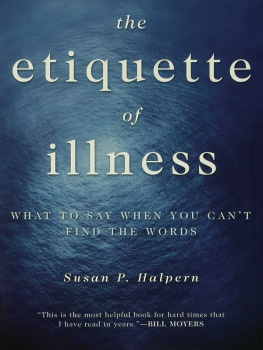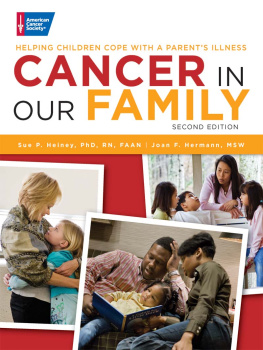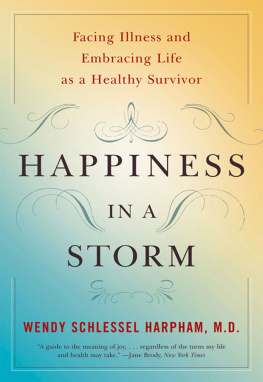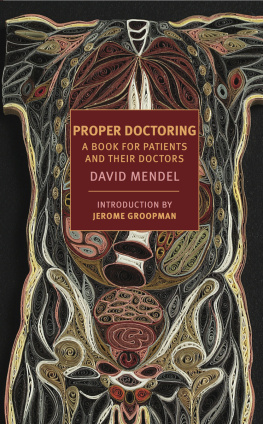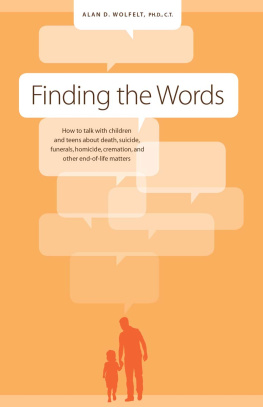THE ETIQUETTE
OF ILLNESS
THE ETIQUETTE
OF ILLNESS
What to Say When You Can't Find the Words
Susan P. Halpern
BLOOMSBURY
Copyright 2004 by Susan P. Halpern
All rights reserved. No part of this book may be used or reproduced in any manner whatsoever without written permission from the publisher except in the case of brief quotations embodied in critical articles or reviews. For information address Bloomsbury, 175 Fifth Avenue, New York, NY 10010.
Published by Bloomsbury, New York and London
Distributed to the trade by Holtzbrinck Publishers
All papers used by Bloomsbury are natural, recyclable products made from wood grown in well-managed forests. The manufacturing processes conform to the environmental regulations of the country of origin.
Library of Congress Cataloging-in-Publication Data
Halpern, Susan P.
The etiquette of illness: what to say when you can't find the words / Susan P. Halpern1st U.S. ed.
p. cm.
eISBN: 978-1-58234-383-9
1. Medicine and psychologyMiscellanea. 2. SickPsychologyMiscellanea. 3. Interpersonal communicationMiscellanea. 1. Title.
R726.5.H327 2004
616'.001'9dc22
2003022604
First U.S. Edition 2004
3 5 7 9 10 8 6 4
Typeset by Hewer Text Ltd, Edinburgh Printed in the United States of America by R.R. Donnelley 6c Sons, Harrisonburg, Virginia
This book is dedicated to Charles, with love
Contents
My friend Paul Gorman called at nine-thirty on a Saturday morning and asked me earnestly, "Do you want me to ask you about the CAT scan you had this week? I don't know if you want to talk about it."
I was delighted by Paul's question and could not wait to answer him. And I was also struck by the form of his question. For me, Paul's formulation in seeking information was respectful and caring, and opened the way to a long conversation. He wanted to know how I was. He wanted to know how I would be. He wanted to know how I had reacted to what was on my plate. But he also did not want me to have to talk about my scan if I wasn't ready or in the mood. In his question I heard that he cared about my need for privacy, and that he wanted to support my husband and me with his friendship. By asking the question, "Do you want me to ask," he was able both to ask for information and give me the space I needed.
I replied, "If you are a good enough friend to know that I had a CAT scan this week, you are a good enough friend to ask how it went." I was touched that Paul remembered and that he wanted to know the results. By putting his interest forward in the form of a particular kind of question, he gave me the right to answer him as I needed to. We went on to talk about the difficulties of addressing friends, family, and strangers about illness or death.
Can there be an etiquette book for this subject? Is there a right way? How do we make ourselves more comfortable talking about illness? We tossed these questions back and forth. I was intrigued. This topic felt important to me. I have been fumbling my way through sympathy cards and condolences all my life, and now because of a cancer diagnosis I am often on the receiving end.
There should be a book, I thought. To write about this subject would give me the opportunity to tell the stories of the people in the support groups I have been facilitating for six years, as well as stories from my own life and the lives of my friends. So many people with insight and courage have shared their stories with me during my journey with cancer. Now I finally have a chance to tell their stories and to help others find their way to a comfortable exchange of words.
MY STORY
In 1995, I was diagnosed with low-grade lymphoma, a cancer of the immune system. Since then, I have been working with individuals and leading groups to support people with cancer. I had spent sixteen years as a psychotherapist working with individuals, families, and groups, and then taken time out from my practice in the late '80s and '90s to cofound a nonprofit organization committed to developing permanent housing for people who were homeless and mentally ill in New York City. The satisfaction of seeing brand new efficiency apartments grow out of the discarded housing stock of the City of New York, watching communities improve, and then witnessing the delight of the tenants selected to move into the completely renovated dwellings was enormous. After my diagnosis, however, I began to dream of sitting quietly in an office and listening to people sort through their lives when faced with difficult medical situations. I wanted to practice psychotherapy again. Two of my friends, Ram Dass and Joan Halifax, were offering support to people who were dying, and they talked about the satisfaction they were finding in that work. They spoke of the possibility of people having a "good death" and what that was like for both the person and caregiver. The lack of adequate care for people and their families at the end of life was beginning to receive attention, and I wanted to be part of the growing group of people serving in this field.
In December of 1995 I participated in a program in Bolinas, California, for people with cancer, called the Commonweal Cancer Help Program. I had first heard of Commonweal from a friend who was one of its first participants, and later I met Michael Lerner, one of the cofounders of Commonweal. Commonweal was featured on the Bill Moyers PBS special Healing andthe Mind in 1989. By the time I was diagnosed, Michael was a friend, and I remember well the night he called, as we were choosing oncologists. He called to offer my husband and me his expertise and concern for what had entered our lives and, as he knew, would change them forever. Not long after that I went to Michael's weeklong program for people with cancer. The purpose of the week is to explore of what cancer means for each of the eight participants. It is a time to learn experientially what it takes to heal and to begin to make choices for what kinds of care and treatment will offer each participant the best chance at living fully for as long as possible after leaving the retreat. During that week I began to speak aloud about my dream of leaving my job to work with people with cancer. With the support of the Commonweal experience, I was able to move in the direction I had dreamed of going.
The next spring, as I was getting ready to leave the housing program and go on sabbatical in Italy for three months with my husband, Michael Lerner called to say he was starting an East Coast program that would replicate the Commonweal Cancer Help Program. He hoped that I would consider joining the staff of this new organization, to be called Smith Farm Center for the Healing Arts. In true Michael style, he told me to not even think about my decision while I was on sabbatical, but to wait until I returned. I was already saying yes as he was talking; when I returned from Italy, I formally accepted his offer.
I have a master's degree in social work, with special training in family therapy, Gestalt therapy, and group theory and practice. My family therapy training gives me an understanding of how an illness affects all members of the system and what the possible repercussions may be. The Gestalt training has given me the ability to work directly with emotions, including fear, grief, and anger, as they arise. I have helped people access their emotions and move through them, so they come out in a different place.
So one year after I discovered an enlarged node in my left groin, I entered the world of healing. Since the fall of 1996 I have been on the staff of Smith Farm Center for the Healing Arts, and through my participation in that program, I have heard the stories of many people who have walked the cancer trail. I have performed several different functions within the organization, from intake/ outtake worker to coleader. The coleader facilitates either the morning support group or the evening discussions, as well as offering individual time to each participant.
Next page
